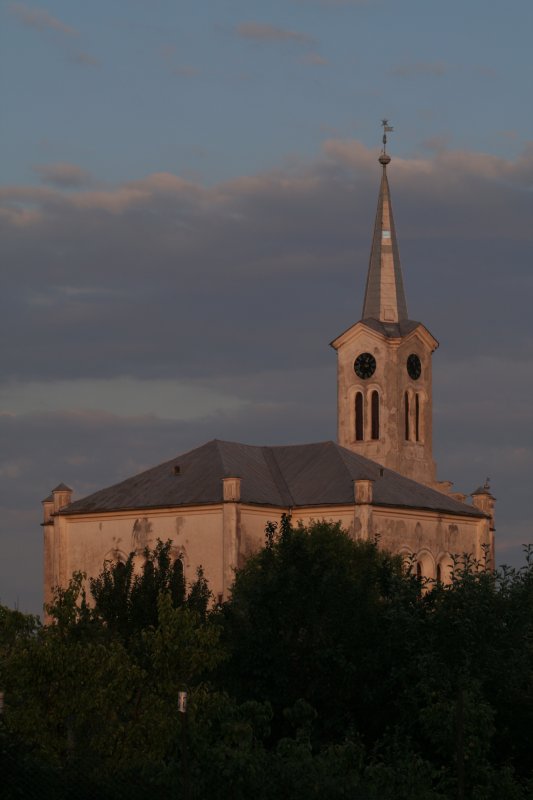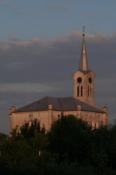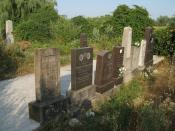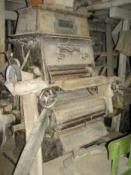
 0x Gevonden
0x Gevonden  0x Niet gevonden
0x Niet gevonden  0 Opmerkingen
0 Opmerkingen  0 Volgers
0 Volgers  Beoordeeld als: n/b
Beoordeeld als: n/b
 Cache attributen
Cache attributen

 The village is written in Oradea's legal registers from 1213-1217 along with other villages in the area, this this settlement must've been much older. Just as Jánosd, Szigeti, Solymos, Székelytelek, Görbed - also mentioned in that register; Ginta survived the tatar attacks, turkish rule and two world wars. It's inhabitants are peaceful and lively people.
The village is written in Oradea's legal registers from 1213-1217 along with other villages in the area, this this settlement must've been much older. Just as Jánosd, Szigeti, Solymos, Székelytelek, Görbed - also mentioned in that register; Ginta survived the tatar attacks, turkish rule and two world wars. It's inhabitants are peaceful and lively people.
Sundays today hardly differ from those half a century ago. You can still hear people sing in the church. Perhaps in those times of war, such words might've been said, words of wisdom then and now still :
"And then Jesus said: Don't be afraid! Go and tell My brothers to go to Galileea, for there they will see Me. And then Jesus said: Don't be afraid ..."
Priest Boros Ferenc served in the reformed church of this village in 1933. He loved literature, he himself wrote. His short novels and poems were published in Havi Szemle (monthly magazine). During the war he wrote a satirical handwritten magazine that was meant to raise the morale of the people and of the deported jews that were forcefully resettled into this village.
 Near the church, from the windows of the parohial house, one could hear the beautiful sound of the piano. Besides Liszt and other classical masterpieces, the priest's wife sang joyfully all the well known Christmas songs as well.
Near the church, from the windows of the parohial house, one could hear the beautiful sound of the piano. Besides Liszt and other classical masterpieces, the priest's wife sang joyfully all the well known Christmas songs as well.
In 1940 the border between Hungary and Romania was changed and ran just a few km from Ginta, the village itself being on the romanian side. The Second World War mostly avoided this part of the Crisul Negru river, but in the fall of 1944 one tragic day befell this peaceful village. Based on eye witness accounts, the village priest wrote a chronicle of what happened.
Proces-verbal
întocmit în prezbiteriul din Ginta,
la data de 29 decembrie 1944.
The Vienna act of september 1st, 1940, gave hungary the northern part of Transilvania, the from june 22 1941 when Germany invaded Soviet Russia, Romania joined in on the german side. These events led to an exodus of most of our believers. Either seeking a better life or to escape the military service or forced labor camps, about a third of our people left for the hungarian teritory of that time.
In august 23rd 1944 Romania declares and armistice. A few days later the priest is taken by force to Halmagel, along with 6 other priests, teachers and other educated people from Ginta and 84 total from Bihor county and suffered a ill treatment while interned there. He returns home on september 27th same year.
Meanwhile, on september 14th, the advancing hungarian troops arrived in Ginta, counter-attacking the romanian army, this time on the russian's side. The village was occupied for 10 days. During this time, hungarian troops reached Lunca near Vascau but met the russian army and were forced to retreat.
Sunday, 24th of september, the hungarian rear, about 100 troops, occupied the village streets and for a few hours tried to resist the advancing romanian 3rd division mountain troops. By 16:00 hours, the hungarians left the village, but the romanian army, once entering the village, took revenge upon it's peaceful inhabitants.
41 people were executed, mostly of our church, others were beaten, women were raped, houses and gardens were looted and then set on fire. Soldiers and some romanians from nearby villages took people's posessions, tools, farm animals.
That day the parohial house of the reformed church was set on fire. Built in 1800, it served as home for 144 years to the priest of the village's reformed church. Only ruined walls remained and all the posessions of the priest and his family burned with it.
The church archives and library was destroyed along with most of the religious objects, with the exception of an eucharist plate.
 Extra waypoints
Extra waypoints
| Symbool | Soort | Coördinaten | Beschrijving |
|---|---|---|---|

|
Interessante plek | --- |
Biserica Reformata [RO] Biserica a fost construita dupa modelul catedralei din Debrecin, amploarea ei reflectand prosperitatea satului in acea vreme [EN] The church was build after the Debrecen cathedral, it's size shows the prosperity of the village at that time |

|
Interessante plek | --- |
Barajul [RO] Barajul din beton, vechi de peste 100 de ani, a fost construit pentru a dirija apa Crisului Negru catre moara. [EN] Build of concrete over 100 years ago, this dam on the Crisul Negru river brought the water needed for village mill. |
 Extra hints
Extra hints
 Afbeeldingen
Afbeeldingen
 Logs:
Logs:
 0x
0x
 0x
0x
 0x
0x




 Beschrijving
Beschrijving





